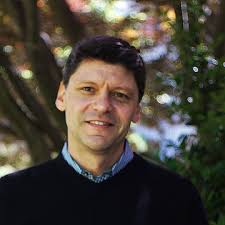Download the Poems for Henry Crawford at Poets vs The Pandemic Reading
Introduction to the Binary Planet By David Keplinger
Henry Crawford has been writing poetry for ten years, but I would hesitate to say that any of his poems are as young as a decade. Somewhere in Times Square in the early 1960s he may have composed most of them, but the boy he was lacked a language then, and then he spent most of his adult life, first in the Law and later in the nascent worlds of computer programming, framing a name for how it was back then, how it felt to be lost in a framework much bigger than the individual, much more impersonal and monolithic, a system more like a game of pinball run on chance and a little skill by the big people who controlled the paddles. So his poems grew in him, until he was grown, and his children had nearly grown, and then he began to speak the first of them.
Crawford's first book, AMERICAN SOFTWARE, as all first books must, taught the reader his private language, even as the writer began to employ it, an anaphoristic tongue of repetitive legalese, but whose whereases and therefores had been replaced by assertions of maternal boyfriends smashing TVs and breathless confessions on autoplay. Most recognizable, there and in the poems that followed, were the use of brackets familiar to C++ and other code languages, which marked Crawford as a prosodist of great skill. His work never stayed satisfied with traditional forms but turned to the structures and conventions of game shows, soap operas, and other cultural conditionings that shape our American expectations beyond the reasonable, a kind of false hope that reaches tragic proportions. In that first book, like Telemachus, Crawford's speaker goes searching for a father and his forefathers, not so much demanding but imploring an explanation from them. The journey, called poetry, of course, can only lead back to the highest self, which much choose to reject the world and its failings, or to accept it as it is.
In his newest collection, BINARY PLANET, these linguistics have been mastered to the point where the received forms of anaphora and algorithmic grammar have faded into the dark at the back of the stage, until what's left now is a pure heart of firm convictions, a serious student of the world in a debate waged for his life. The stakes rise beyond what we might call a merely playful or experimental use of language, but instead reach a state of mind where language and truth are disappearing before our eyes, so we must be very careful and very precise about what we say and what we choose to hear. "Words that made people feel uncomfortable/like [fetus] or threatened the powerful/like [science-based] had to be deleted," he writes in "7 Disappearing Words.." In what I see as a partner poem to this one, "The Love Poem of an Average Man," most of the words have so faded into the backdrop, now they are a kind of elevator Muzak that only allows occasionally a note of clarity: "we...wield...the sharpest...knives." The poem is his masterpiece, aligning him with the Modernist impulse to reassemble the broken mythologies and to capture something of the eternal within the small, the insignificant, the ordinary.
BINARY PLANET is a world made of zeroes and ones, but Crawford uses language (with all of its failings) to unfailingly be both yes and no at the same time. The genius of this writer, whether joyously zinging through the pinball map of D.C., which is his home, or "Making an Insurance Claim," is his significant skill at turning a storm into a snow globe, and a child's toy or a television into the evidence of trauma. I admire his gift to recognize the flawed assumptions behind even our most casual beliefs. Life is never zero or one, good or bad, yes or no, though in politics and popular culture it often "seems to be" that way. What is romantic about this writing is clear, but there is a classical philosophy at work, chugging along from start to finish, to bravely undo what "seems to be" the stories of our lives. Soon we find our lives are only ever right here, "amid the /dead minutiae of interstellar waste/barreling along on blind rubber/ [obeying the same laws]," as the little vehicle of the body "thrusts us/out [onto the road ahead] moving/always farther away." For the lyric narrative poet, the challenge is to find an angle that would situate the reader as firmly in time as in eternity: to be nowhere, as someone once put it, and now-here. That is the planet Henry Crawford began to map fifty years ago, and after all his travels and discoveries, I am grateful that he is setting it into legend.
David KeplingerWashington D.C.
January, 2020
